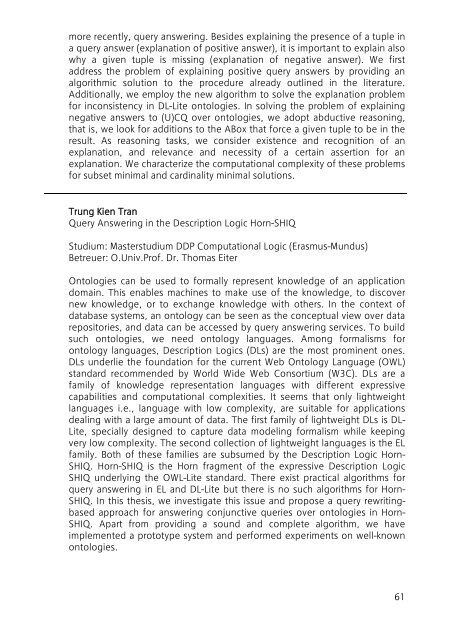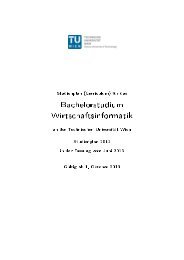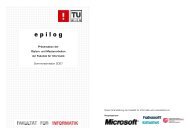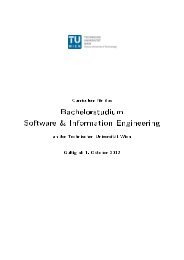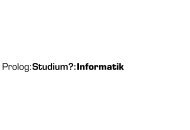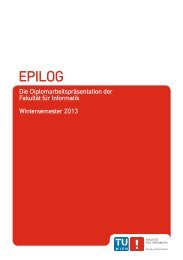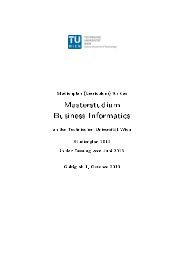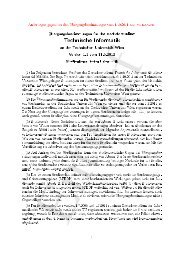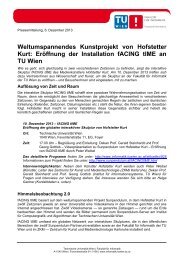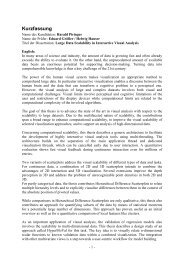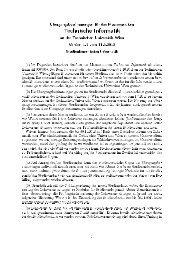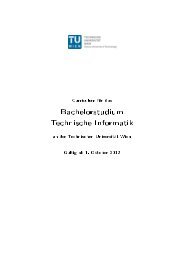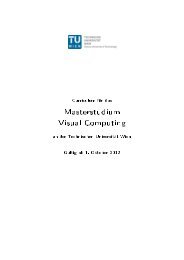Abstract-Band - Fakultät für Informatik, TU Wien - Technische ...
Abstract-Band - Fakultät für Informatik, TU Wien - Technische ...
Abstract-Band - Fakultät für Informatik, TU Wien - Technische ...
Sie wollen auch ein ePaper? Erhöhen Sie die Reichweite Ihrer Titel.
YUMPU macht aus Druck-PDFs automatisch weboptimierte ePaper, die Google liebt.
more recently, query answering. Besides explaining the presence of a tuple in<br />
a query answer (explanation of positive answer), it is important to explain also<br />
why a given tuple is missing (explanation of negative answer). We first<br />
address the problem of explaining positive query answers by providing an<br />
algorithmic solution to the procedure already outlined in the literature.<br />
Additionally, we employ the new algorithm to solve the explanation problem<br />
for inconsistency in DL-Lite ontologies. In solving the problem of explaining<br />
negative answers to (U)CQ over ontologies, we adopt abductive reasoning,<br />
that is, we look for additions to the ABox that force a given tuple to be in the<br />
result. As reasoning tasks, we consider existence and recognition of an<br />
explanation, and relevance and necessity of a certain assertion for an<br />
explanation. We characterize the computational complexity of these problems<br />
for subset minimal and cardinality minimal solutions.<br />
Trung Kien Tran<br />
Query Answering in the Description Logic Horn-SHIQ<br />
Studium: Masterstudium DDP Computational Logic (Erasmus-Mundus)<br />
Betreuer: O.Univ.Prof. Dr. Thomas Eiter<br />
Ontologies can be used to formally represent knowledge of an application<br />
domain. This enables machines to make use of the knowledge, to discover<br />
new knowledge, or to exchange knowledge with others. In the context of<br />
database systems, an ontology can be seen as the conceptual view over data<br />
repositories, and data can be accessed by query answering services. To build<br />
such ontologies, we need ontology languages. Among formalisms for<br />
ontology languages, Description Logics (DLs) are the most prominent ones.<br />
DLs underlie the foundation for the current Web Ontology Language (OWL)<br />
standard recommended by World Wide Web Consortium (W3C). DLs are a<br />
family of knowledge representation languages with different expressive<br />
capabilities and computational complexities. It seems that only lightweight<br />
languages i.e., language with low complexity, are suitable for applications<br />
dealing with a large amount of data. The first family of lightweight DLs is DL-<br />
Lite, specially designed to capture data modeling formalism while keeping<br />
very low complexity. The second collection of lightweight languages is the EL<br />
family. Both of these families are subsumed by the Description Logic Horn-<br />
SHIQ. Horn-SHIQ is the Horn fragment of the expressive Description Logic<br />
SHIQ underlying the OWL-Lite standard. There exist practical algorithms for<br />
query answering in EL and DL-Lite but there is no such algorithms for Horn-<br />
SHIQ. In this thesis, we investigate this issue and propose a query rewritingbased<br />
approach for answering conjunctive queries over ontologies in Horn-<br />
SHIQ. Apart from providing a sound and complete algorithm, we have<br />
implemented a prototype system and performed experiments on well-known<br />
ontologies.<br />
61


